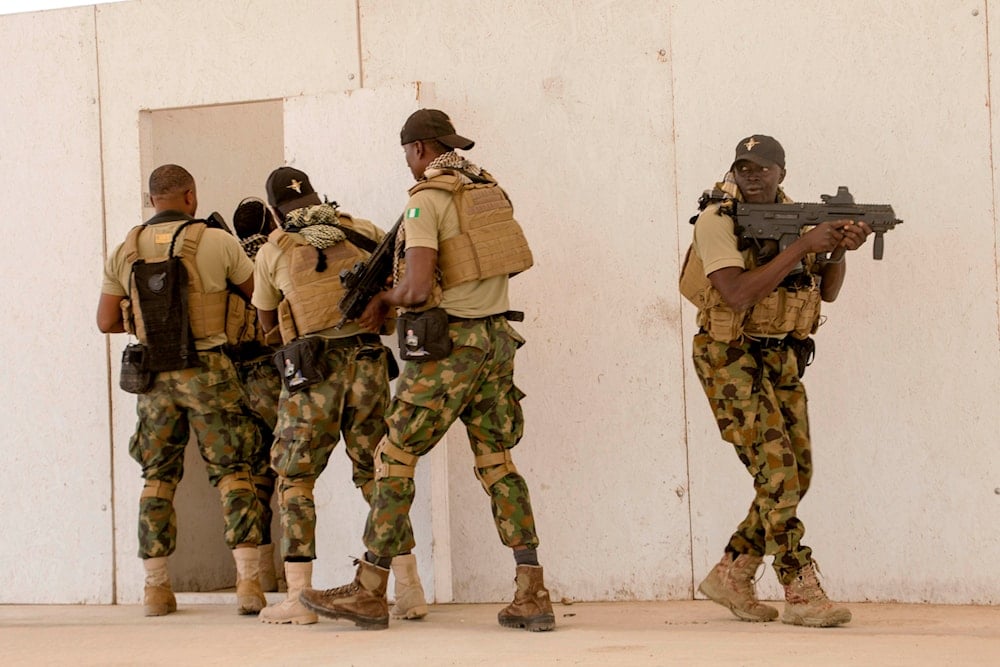US arms sale to Nigeria raises human rights concerns: RS
US arms sale to Nigeria sparks concerns over human rights violations, as weapons are supplied to units implicated in civilian abuses despite legal safeguards.
-

Nigerian Navy Special Boat Service troops exercise under the supervision of British special forces during a United States-military-led annual counterterrorism exercise in Thies, Senegal, on February 18, 2020 (AP)
The United States has notified Congress of a $346 million arms sale to Nigeria, even as the State Department released its 2024 Country Report on Human Rights Practices, highlighting widespread abuses by Nigerian security forces. The new weapons package, including munitions, precision bombs, and rockets, is intended for operations in Nigeria’s northeast and the Gulf of Guinea, regions marked by insurgency, piracy, and illegal trafficking.
According to Responsible Statecraft, the arms are being supplied to units whose misconduct has been consistently documented, including arbitrary killings, disappearances, sexual violence, and excessive force against civilians.
Human rights violations in Nigeria
The 2024 human rights report underscores long-standing concerns about impunity within Nigeria’s security apparatus. Military operations against terrorist and criminal groups frequently result in civilian casualties. Women and children removed from or associated with the militants are often held in poor conditions, sometimes for extended periods, allegedly for intelligence purposes.
Responsible Statecraft noted that these abuses occur in the same theaters where the new arms are intended to be deployed, raising legal and ethical concerns over US compliance with domestic law.
“If approved, U.S.-origin weapons would arm units whose egregious abuses bordering on war crimes are confirmed not just by civil societies but by the U.S. State Department,” the news website wrote.
Read more: US bypassing law to fund 'Israel' despite rights abuses, lawsuit says
Legal frameworks and enforcement gaps
US law, including Section 502B of the Foreign Assistance Act, prohibits providing security assistance to countries engaged in a “consistent pattern of gross violations of internationally recognized human rights.”
However, successive administrations have routinely overlooked these provisions, prioritizing strategic objectives over civilian protection.
Responsible Statecraft observed that “not once have any of the relevant legal provisions conditioning arms sales on respect for human rights and civilian harm concerns been enforced.”
While Congress has occasionally delayed shipments, such as the Biden administration’s 2022 halt of 12 AH-1 Cobra helicopters, approvals have ultimately proceeded.
Read more: Drone attacks killing hundreds of civilians across Africa: Report
Operational and accountability challenges
Beyond legal concerns, Nigeria’s military faces practical limitations in using advanced weaponry responsibly. Past airstrikes, including the mistaken bombing of a displaced persons camp in Rann in 2017 that killed more than 236 civilians, illustrate recurring coordination failures. A Reuters analysis via ACLED documented over 2,600 deaths across 248 air strikes over five years.
“Acquiring advanced weaponry is one thing; the ability to use it in an effective and responsible manner is another,” Responsible Statecraft highlighted.
Read more: Nigeria: 27 killed in armed attack on mosque during dawn prayers
Strategic priorities vs human rights
The report argued that Washington routinely elevates “other competing priorities, including addressing threats from non-state actors and strategic competition by other key powers, over concerns for civilian protection and human rights.”
Critics warn that without robust accountability mechanisms and restoration of Pentagon programs dedicated to civilian harm mitigation, the latest arms package could exacerbate civilian suffering and undermine US credibility in human rights advocacy, which has already been severely damaged by Washington's ongoing support for the Israeli war of genocide in Gaza.
Read more: Weapons first: How US arms sales bury human rights under the rubble

 3 Min Read
3 Min Read










